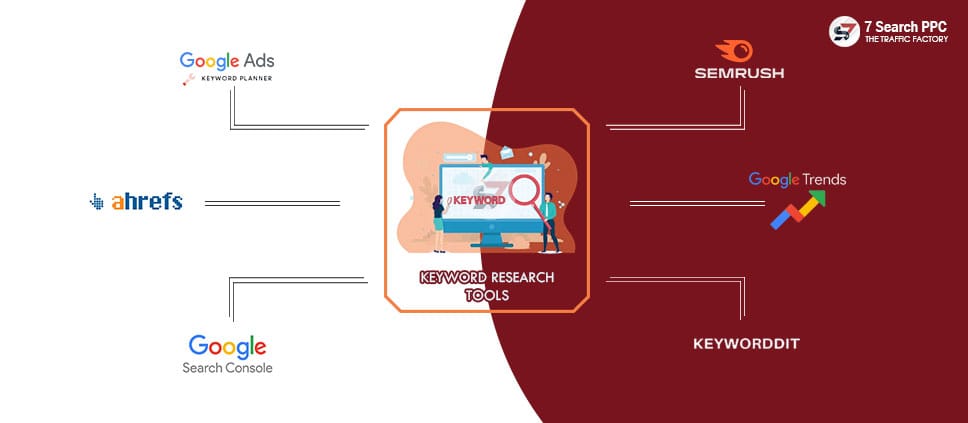Do you want to enhance the indexing and ranking of your blogs in the Google Search Engine? But have you ever thought about how your blog gains visibility in the SERPs? Yes, you got it right, the Keywords! You can Use Keywords In Blog posts, but you have to know the basics.
If you pay close attention to the listing of any Search Engine Result Page (SERPs), you will find the filtering of highly searched relevant keywords. That is why it’s crucial to Use Keywords In Blog Posts at the right place to make your journey as a blogger successful.
The appropriate placement of keywords in your content has a better chance of ranking. “How to use keywords in a blog post”? Often these questions come to our mind when we think about keywords.
Do not worry! You are on the right platform to clear all your confusion and get a satisfactory answer.
Remember, there is only a thin line between using a keyword and overusing it. In this blog, you will get step-by-step guidance on how to use keywords correctly in the content.
But, firstly, we will tell you what keyword research is and how to search keywords for blog posts.
What Is Keyword Research?
Keywords research is the research technique that a content creator and SEO expert use to analyze and find search terms that often people enter into search engines.
One uses these search terms to discover specific information and uncover the search queries. Also, you will see the popularity of these queries and the ranking difficulty due to huge competition.
Proper keyword research is a sign of a better content-writing strategy. It helps you explore the words and phrases that users usually enter into search engines to find product services and content in your industry.
How To Search Keywords for the Blog Post
Keep yourself updated with recent Google algorithm changes to find out the best keywords for blog traffic. Research for applicable keywords helps you get highly engaging content ideas that readers will love to read, and it will also grow traffic.
Here we have described some best paid and unpaid keyword research tools. You can use these tools for doing keyword research like a professional.

Google Keyword planner
Google Keyword Planner is a free keyword research tool. It will help you discover and make a list of thousands of long-tail keywords related to any topic.
When you input a single keyword in the keyword planner search box, you will find a list of multiple keywords related to the same keyword. According to this list, you can modify your site content and make it easy to rank.
Google Trend
Google Trend is another free keyword research tool from the side of Google. It helps you explore the popularity of entered keywords over time.
By using this tool, you can get filtered data according to the location of a particular keyword. For beginners, Google Trends can help to plan a content calendar.
Keyword Generator
With Keyword Generator, you can search out a bulk of( about 150) keyword ideas for a seed keyword.
It also lets you know the monthly search volume of a particular keyword. And, for this tool, you do not need to pay.
Google Search Console
Google Search Console is a free tool that helps website owners track the site’s performance in Google organic search. It helps you monitor and manage your site for Google search results.
With the appliance of this tool, you can get a lot of data about the indexed keyword in Google search results.
This tool also lets you identify the issues that do not allow your website to get ranked.
SEMrush
SEMrush is the best SEO tool often used for keyword research and evaluating the ranking data of competitors’ keywords.
Although it is a paid SEO tool, it allows depth analysis of competitors’ landscape and common keywords’ position in Google search results.
This is the best SEO tool that mainly covers keyword research, competitive research, SEO, and content marketing.
Ahrefs
Ahrefs is one of the best paid online keyword research tools. This tool helps you identify why your competitors are ranking so high.
Ahrefs also allows you to analyze what you need to do to beat your competitor’s ranking in search results.
Simply entering keywords in the Ahrefs search box, you can generate a bulk of keyword ideas. Use these keywords ideas in your content to make it unique for readers.
This tool also lets you discover a list of keyword suggestions that have a high search volume.
On the other hand, Ahrefs also make you able to optimize your website, track your ranking progress, and study what your users are searching for.
Keyworddit
Keyworddit is only a unique user-friendly tool that extracts long-tail keywords and seed keyword ideas from Reddit.
This tool has an exclusive feature of an auto-generated subreddit list. You just need to enter a subreddit name into the search box that you want to search.
The keywords suggestions list helps you pick up the topics that most people are looking for.
Keyworddit is a free tool to use. However, it provides digital marketing services on a paid basis.
For a beginner, this tool can be a fantastic starting point if you know or even if you do not have any idea about the niche.
Apart from the keywords ideas, Keworddit also gives you the best help in monitoring the monthly search volume for every keyword.
Where to Use Keywords In the Blog Posts?
But, once you choose the right keyword, it is also crucial to know where to Use Keywords In Blog Posts at the right place.
Randomly, inserting keywords in your content is not a good way of content writing strategy for long-term success.
Although using a keyword is not easy just say that you need to place a keyword in your SEO content to rank your site.
To attract the right traffic to your site and rank it on the first page of SERPs, you need to understand how to insert keywords in the blog.
Following are the steps to Use Keywords In Blog Posts and make your blog exclusive for readers.
Use Keywords In the Title
Marketers and even SEO executives often do not pay much attention to the title. But they should know that title is essential for the users, yes it is!
The title on search result pages stands out due to its font (large size) and color (usually blue). Most search engines prefer to shorten the long titles, but it is important to include the keyword.
So as far as possible, try to use keywords in the title to make your blog ever best. Using keywords in your title can be the best starting point for search engine optimization.
Generally, users are expecting to see the phrase and search words they are looking for, and the SEOs and advertisers must do so.
Use Keyword In the Meta Description
A meta description is a brief introduction that describes the information to the users about what your content is.
It is the perfect opportunity to Use Keywords In Blog Posts between the meta descriptions on a search result listing. That area is the description, and it catches users’ eyes.
But be sure that you need to craft a captivating description using natural language to enhance the most crucial aspect- readability.
Keywords in the meta description have more changes to improve the click-through rate of your web page.
Use Keywords In the URL
Another exciting place to include your keywords is the destination URLs, or the location user ends up by clicking your listing. It is a great strategy to get a super click-through rate.
Usually, URLs have the consumer keyword within a named sub-domain or subfolder. Try to implement the primary keyword or focus keyword in the title which would be the URL of this page when you publish it.
Use Keywords In the Headings
Headings are subsections of titles mainly used to break up your content to make it easy to read. H1s, H2s, and H3s are the three main headings and subheadings for SEO content.
Do not ignore applying keywords in the headings to help Google recognize your content’s importance. Using Keywords in the headings might be the best way to rank your blog.
Use Keywords In the First 200-word
Experts prove that Google gives more strength to the first 200 words in your blog. It is because the first 200 words provide an introduction to the whole blog. Keywords in the first 100-200 words might be a well-ranking factor
Use Keywords Naturally Throughout the Blog
Try to place the keywords in your article that look natural while reading, improving the readability and readers’ engagement. Do not compromise the blog ranking gets lower down due to bad keyword placement.
Now you have understood how to use keywords in the blog post. But also, you should keep an eye on how many keywords you should use in the blog.
So let’s move on to that point!
How Many Keywords can you use in the blog?
Often this question comes to our mind when we talk about placing keywords in the blog. So the great answer depends on how the keywords relate to each other and on the length of the content.
Firstly, Let’s discuss the type of keywords for SEO.
Primary Keyword
The primary keyword is the focus keyword of the entire blog on which you want to rank your article.
Secondary Keywords
The Secondary keywords are the complementary keywords of primary keywords. These keywords play a supportive role in the primary keyword for its marketing.
Additional Keyword
Additional keywords are the related keywords of the primary two keywords spelled and phrased differently, but they mean the same thing.
So again, let’s come to the point of how many keywords you should use in a blog post.
In most cases, applying a total of 3-8 keywords would be appropriate depending on the content length. To make it easy, You can divide these keywords into 1 primary keyword, 1-4 secondary keywords, and 3-5 additional keywords.
The proper placement of keywords gives you a winning chance to start ranking in search engine result pages (SERPs). Insert the keywords in your content in such a way that comes naturally while reading. It makes your content worthwhile for users.
I hope that you will get all your needed information on how to Use Keywords In Blogs Posts. To get practical knowledge, you can visit the blogs at 7Search PPC.
FAQs
Why are the keywords important for a blog?
Ans. Keywords are important as they help search engines identify your web page’s content while indexing. People often search the information by entering the keywords that help make your blog viral and generate traffic.
How to use long-tail keywords in blog posts?
Ans. Long-tail keywords are very specific keywords that have a low search volume per month. Generally, these keywords have only two to three words specifically targeting a niche.
First of all, do proper research, design a list of specific keywords, and then apply it to your content.
How should I use keywords in a blog post?
Ans.
Try to use long-tail keywords in the title to make your content trendy
Discover familiar keywords that usually people search
Use the keywords in the meta description and headings
Try to optimize your articles’ images with keywords.
How many keywords can you use on one web page?
Ans. Using two to three keywords per page will be appropriate for an exclusive blog. You can include one main keyword and two other secondary and additional keywords per page.
How many times should keywords look in a blog?
Ans. Many SEO professionals prove that using keywords once per 200 words is suitable for the standard blog. Use the ideal keywords relate to the content, readers will love to read.
More Resources:
How To Make Money With Your Blog In 2022?


















